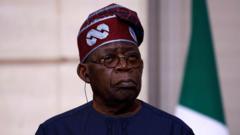**Mexicans are gearing up to elect over 2,600 judges and magistrates in a significant shift from an appointment-based system to popular elections, raising debates on democracy and judicial integrity.**
**Electoral Shift: Mexico's Landmark Vote for Judges**

**Electoral Shift: Mexico's Landmark Vote for Judges**
**A historical election set to reshape the judiciary reveals deep political divides and new democratic aspirations.**
In a defining moment for Mexico, citizens will head to the polls this Sunday to participate in the first-ever election for judges and magistrates. With more than 2,600 positions across federal, state, and local courts, including critical roles on the Supreme Court, the stakes are high. This transition marks a shift from a historically appointment-focused judiciary to a system where voters directly choose their judicial representatives.
Supporters of the change, championed by President Andrés Manuel López Obrador and his successor Claudia Sheinbaum, argue that electing judges enhances democracy, reduces nepotism, and addresses pervasive corruption. However, opponents raise concerns about the implications of increased political control over the judiciary, arguing that this approach could dilute qualifications and experience among candidates while opening the door to potential influence from organized crime.
The underlying motivation for this radical overhaul stems from recent Supreme Court rulings that have obstructed various initiatives proposed by López Obrador’s government, prompting a reevaluation of the judicial landscape. As this transformational election approaches, uncertainty looms: will it bring about the intended reforms and greater accountability, or will it deepen fractures within Mexico's judicial system?
With intense public interest and potential long-term consequences, this election is poised to be one of the most significant in Mexico’s democratic history, requiring careful scrutiny from voters and analysts alike.
Supporters of the change, championed by President Andrés Manuel López Obrador and his successor Claudia Sheinbaum, argue that electing judges enhances democracy, reduces nepotism, and addresses pervasive corruption. However, opponents raise concerns about the implications of increased political control over the judiciary, arguing that this approach could dilute qualifications and experience among candidates while opening the door to potential influence from organized crime.
The underlying motivation for this radical overhaul stems from recent Supreme Court rulings that have obstructed various initiatives proposed by López Obrador’s government, prompting a reevaluation of the judicial landscape. As this transformational election approaches, uncertainty looms: will it bring about the intended reforms and greater accountability, or will it deepen fractures within Mexico's judicial system?
With intense public interest and potential long-term consequences, this election is poised to be one of the most significant in Mexico’s democratic history, requiring careful scrutiny from voters and analysts alike.



















